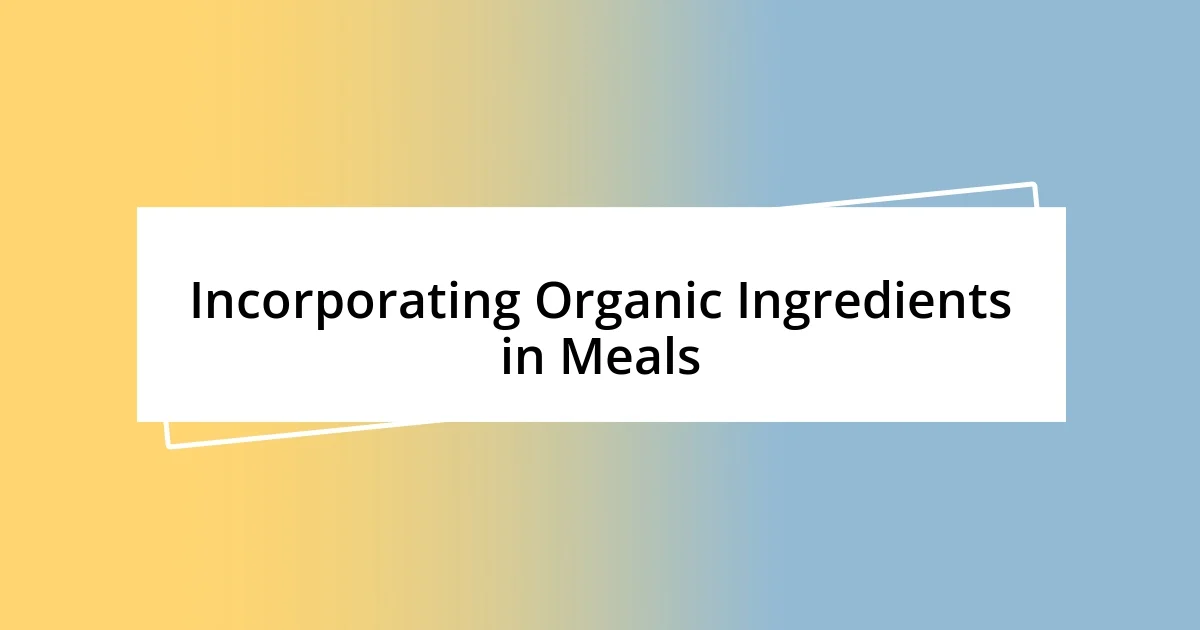Key takeaways:
- Transitioning to organic ingredients enhances both health and cooking experience, bringing richer flavors and a sense of responsibility towards sustainable practices.
- Creating a transition plan with achievable goals and support systems transforms the move to organic into an enjoyable journey instead of a daunting task.
- Maintaining an organic lifestyle involves meal planning, supporting local farmers, and building community connections, enriching both personal health and social bonds.

Understanding Organic Ingredients
When I first started exploring organic ingredients, I was struck by how different they felt—both in texture and flavor. The vibrant colors of fresh, organic vegetables caught my eye at the farmer’s market, and I could almost feel the nutrients bursting within them. Isn’t it fascinating how much the origin of our food can influence not just our health but also our overall cooking experience?
Understanding organic ingredients goes beyond just what’s on the label; it’s about embracing a philosophy of sustainable living. I remember the first time I tasted a ripe, organic tomato—it was a game changer. It made me wonder, how many subtle flavors have I missed out on by choosing conventionally grown produce? This experience opened my eyes to the potential of organic foods, each bite a reminder of the connection between health, environment, and taste.
The principles behind organic farming resonate deeply with me. Knowing that these ingredients are grown without harmful pesticides and synthetic fertilizers brings a sense of peace. It aligns with the values I cherish—caring for the planet while nourishing my body. Does it feel the same for you when you choose organic? That sense of responsibility not only enriches my meals but also nurtures my soul.

Benefits of Using Organic Ingredients
The benefits of using organic ingredients are far-reaching. I’ve found that these ingredients often boast richer flavors compared to their conventional counterparts. For instance, I remember sautéing organic kale for the first time. The color was deep and vibrant, and the taste was earthy and hearty—a flavor explosion that had my taste buds dancing! It really made me aware of how quality ingredients elevate the whole cooking experience.
Another notable benefit is the health aspect. Organic ingredients are grown without synthetic pesticides and fertilizers, which means I can enjoy my food without worrying about ingesting harmful chemicals. There was a time when I experienced digestive issues, and switching to organic products helped alleviate some of those problems. I felt lighter, more energized, and less bloated. It’s amazing how what we consume directly impacts how we feel daily.
Finally, opting for organic ingredients supports sustainable farming practices. Each time I choose organic, I feel a sense of purpose—knowing that I’m contributing to ecological balance. Visiting local farms where crops are grown with care and integrity has been a beautiful journey for me. It reminds me that our choices matter, and every dollar spent on organic is an investment in a healthier planet.
| Benefits | Personal Insights |
|---|---|
| Rich Flavors | Experiencing the vibrant flavors of organic food transformed my cooking. |
| Healthier Choices | Transitioning to organic has led to positive health changes in my life. |
| Sustainability | Supporting organic farming gives me a sense of purpose and connection to the planet. |

Identifying Quality Organic Products
Identifying quality organic products can sometimes feel like a little scavenger hunt, but the rewards are worth it! I recall the first time I selected organic apples at my local grocery store. Their slightly irregular shapes and vibrant hues spoke to their authenticity, and the flavor was a testament to their organic upbringing—juicy and sweet with a satisfying crunch. When you’re on the lookout for organic products, it’s essential to pay attention to their appearance and labels.
Here are some tips I’ve found helpful in spotting top-notch organic products:
- Look for certification labels: USDA Organic or similar certifications indicate adherence to strict guidelines.
- Check for freshness: Organic produce often has a shorter shelf life, so select items that feel fresh to the touch.
- Explore local options: Purchasing from local farmers’ markets can provide insights into the growing practices used.
- Use your senses: Smell and feel the products—freshness is often apparent.
- Research brands: Familiarize yourself with brands that are known for quality organic products to guide your choices.
Taking these steps not only enhances the quality of what I bring home but also deepens my connection to the ingredients I use. It’s like building a relationship with my food, one that’s rooted in trust and quality. Each time I make a mindful choice, I feel empowered, knowing I am contributing to a healthier lifestyle and planet.

Creating a Transition Plan
When I first decided to transition to organic ingredients, I quickly realized the importance of having a well-thought-out plan. I began by setting clear, achievable goals to make the shift manageable. Initially, I focused on just a few staple items—like fruits, vegetables, and grains—before gradually expanding my selection. This step-wise approach helped ease any overwhelm and made it feel like an exciting journey rather than a daunting task.
Creating a timeline was equally beneficial. I remember mapping out when I would fully switch over, allowing room for adjustments if I discovered new organic products that piqued my interest. Setting milestones, like dedicated “organic discovery” days each month, fueled my enthusiasm. It often felt like a mini-adventure each time I ventured into a new store or farmer’s market, searching for those organic gems.
Communicating with friends and family also played a vital role in my transition plan. I shared my goals with them, and you wouldn’t believe how much support I received! My friends began to join me on shopping trips, and it became a fun way to bond while exploring organic options together. Having that accountability not only motivated me but also enriched my experience, transforming what could be a solitary change into a community effort. How about you? Have you ever found encouragement from those close to you when making lifestyle changes? It can make all the difference in maintaining that momentum.

Incorporating Organic Ingredients in Meals
When it comes to incorporating organic ingredients into meals, I’ve found that starting small is the key. The first time I swapped regular pasta for organic whole wheat pasta was a revelation. Not only did it taste better to me, but I felt a sense of satisfaction knowing I was choosing something healthier. Have you experienced that moment when a simple ingredient change makes your meal feel elevated?
Experimenting with organic herbs and spices can truly transform your cooking. I still remember the first time I added organic basil to my homemade marinara sauce. The aroma wafting through my kitchen was nothing short of magic, and the fresh taste brought the dish to life in a way I hadn’t anticipated. It’s amazing how just one organic ingredient can enhance the whole experience—have you ever tried cooking with fresh, organic herbs?
Moreover, I discovered that batch cooking with organic ingredients not only saves time but also maximizes flavor. One Sunday, I prepared a huge pot of organic vegetable soup, packed with carrots, celery, and kale. The leftovers throughout the week made my meals feel effortless, and each bowl was filled with vibrant colors and nutrients that nourished both my body and soul. It was comforting to know that even on busy nights, I could enjoy something wholesome and delicious. Have you ever tried batch cooking? Those repetitive, cozy days in the kitchen can become a cherished routine.

Overcoming Challenges During Transition
Transitioning to organic ingredients certainly comes with its own set of challenges. I remember the initial frustration when shopping; options can be limited or pricier, which took some serious adjustment on my part. Have you ever felt that tug between your budget and your health choices? For me, it meant learning to prioritize purchases—focusing on the Dirty Dozen, which really helped steer my decisions without breaking the bank.
Finding reliable sources for organic products was another curveball. I had to search for farmers’ markets and trustworthy online shops, which often felt overwhelming. However, after countless weekends spent exploring local markets, I not only built a roster of go-to vendors but also formed connections with the farmers. To this day, I cherish those personal relationships. It’s satisfying knowing where my food comes from and enhances my appreciation for the ingredients I use.
Lastly, adjusting my cooking and baking habits posed a unique challenge. I encountered moments where the texture or taste wasn’t quite what I expected, especially with gluten-free organic flours. It felt discouraging at times, but I learned to embrace experimentation in the kitchen. Do you enjoy trying new cooking techniques? I began viewing my cooking as a discovery process, which encouraged my creativity and led to some delightful surprises along the way. Overcoming those hurdles ultimately made my commitment to organic ingredients even more rewarding.

Maintaining an Organic Lifestyle
Maintaining an organic lifestyle is more than just a diet; it’s a way of living that’s both energizing and fulfilling. I recall the moment I decided to shift my grocery shopping habits completely. Instead of rushing through the aisles of a conventional supermarket, I started dedicating my Saturday mornings to local organic markets. There’s something invigorating about supporting local farmers and feeling the connection between my meals and the earth. Can you remember the thrill of choosing fresh produce directly from someone who nurtured it?
Meal planning has been another crucial strategy for upholding my organic lifestyle. I learned that taking a few hours each week to plan my meals not only saves time and reduces waste but also ensures that I’m consistently consuming wholesome ingredients. One weekend, I planned an entire week of dinners based around seasonal vegetables. It brought such joy to my dining table, watching everyone savor the vibrant colors and flavors while knowing that each dish was crafted with care. Have you ever made a meal that felt like a celebration?
I also realized the importance of community in this journey. I joined a local group of like-minded individuals who are passionate about organic living. Sharing recipes, tips, and even gardening experiences with them has infused my journey with inspiration. I still remember a potluck we hosted where everyone brought a dish made with organic ingredients. The atmosphere was alive with excitement, and the taste was proof that organic choices can forge a deeper connection with food and each other. Isn’t it delightful to share that joy of nourishing yourself and others with ingredients that are good for the planet?














